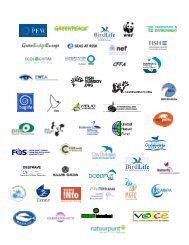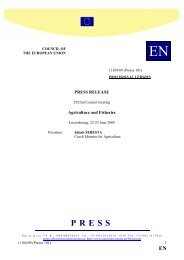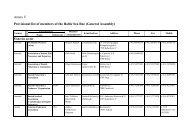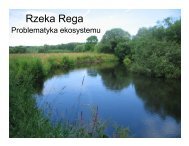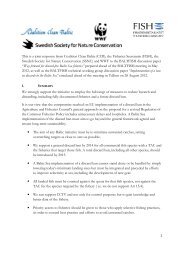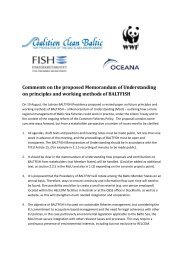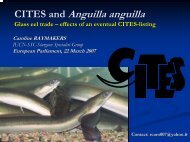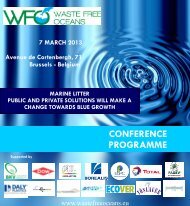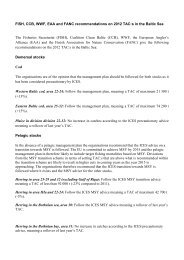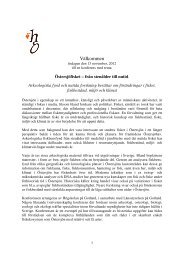A report on iUU fishing of Baltic Sea cod - Fisheries Secretariat
A report on iUU fishing of Baltic Sea cod - Fisheries Secretariat
A report on iUU fishing of Baltic Sea cod - Fisheries Secretariat
Create successful ePaper yourself
Turn your PDF publications into a flip-book with our unique Google optimized e-Paper software.
Part IDescribing and quantifying IUU<strong>fishing</strong> for <strong>cod</strong> in the <strong>Baltic</strong> <strong>Sea</strong>Introducti<strong>on</strong>Scientific advice from the Internati<strong>on</strong>al Council<strong>of</strong> the Explorati<strong>on</strong> <strong>of</strong> the <strong>Sea</strong> (ICES) has indicatedthat the two <strong>cod</strong> stocks in the <strong>Baltic</strong> <strong>Sea</strong>are suffering from unsustainable exploitati<strong>on</strong>levels. The Eastern stock has declined in size to apoint where it may not be able to replenish itselfand is c<strong>on</strong>sidered to be threatened with collapse.The Western stock is in a better state but is alsosubject to high levels <strong>of</strong> <strong>fishing</strong> that mean thatthe yields from the fishery are lower than theirpotential level.Combined with less favourable envir<strong>on</strong>mentalc<strong>on</strong>diti<strong>on</strong>s the ability <strong>of</strong> the two <strong>Baltic</strong> <strong>Sea</strong> <strong>cod</strong>stocks to increase or, minimally, sustain themselvesis further compromised.The <strong>cod</strong> fisheries in the <strong>Baltic</strong> <strong>Sea</strong> have gainednotoriety for n<strong>on</strong>-compliance with fisheriesregulati<strong>on</strong>s. This is comm<strong>on</strong>ly referred to as illegal,un<str<strong>on</strong>g>report</str<strong>on</strong>g>ed and unregulated <strong>fishing</strong>, or IUU<strong>fishing</strong>. IUU <strong>fishing</strong>, particularly in the Eastern<strong>Baltic</strong>, is seen as the major c<strong>on</strong>tributor to theunsustainable exploitati<strong>on</strong> <strong>of</strong> the <strong>cod</strong> stocks.In order to better understand IUU <strong>fishing</strong> in the<strong>Baltic</strong> and the measures that are in place to counterthe problem the study:• Undertook a review <strong>of</strong> the available literature<strong>on</strong> IUU <strong>fishing</strong> within the <strong>Baltic</strong> regi<strong>on</strong>;• C<strong>on</strong>ducted informal meetings/interviews withindividuals with an active interest in the <strong>Baltic</strong><strong>Sea</strong> <strong>cod</strong> fisheries; and,• Reviewed and analysed European fisheriespolicy and regulatory frameworks for c<strong>on</strong>troland enforcement that apply within the <strong>Baltic</strong><strong>Sea</strong>.The <str<strong>on</strong>g>report</str<strong>on</strong>g> is divided into two parts. The firstdescribes the results <strong>of</strong> the literature search andpresents the views expressed by participants <strong>of</strong>the informal meetings/interviews. The sec<strong>on</strong>dpart provides a summary <strong>of</strong> the policy and regulatoryframeworks that are in place and providethe basis for Member States to implement Europeanfisheries policy.Published informati<strong>on</strong>An Internet search revealed quite an extensiveand relatively recent source <strong>of</strong> literature <strong>on</strong> IUU<strong>fishing</strong>, the majority <strong>of</strong> which focuses <strong>on</strong> the highseas. In c<strong>on</strong>trast, very limited peer reviewed and/or “grey” literature has been published that attemptsto describe and/or quantify IUU <strong>fishing</strong> inthe <strong>Baltic</strong> <strong>Sea</strong>. The following secti<strong>on</strong> summarisesthe most recent and readily available informati<strong>on</strong><strong>on</strong> IUU <strong>fishing</strong> for <strong>cod</strong> in the <strong>Baltic</strong> <strong>Sea</strong>, as wellas provides comment and analysis.The Internati<strong>on</strong>al Council for the Explorati<strong>on</strong> <strong>of</strong>the <strong>Sea</strong> (ICES)The Internati<strong>on</strong>al Council for the Explorati<strong>on</strong><strong>of</strong> the <strong>Sea</strong> (ICES) <strong>of</strong>ficially recognises the seriouslevel <strong>of</strong> IUU <strong>fishing</strong> in the <strong>Baltic</strong> <strong>Sea</strong> <strong>cod</strong> fishery,particularly within the eastern <strong>Baltic</strong>. ICESdescribes the main IUU problem as, “...mis<str<strong>on</strong>g>report</str<strong>on</strong>g>edlandings, mostly in the form <strong>of</strong> un<str<strong>on</strong>g>report</str<strong>on</strong>g>edlandings”. It suggests that restrictive quotas, theabsence <strong>of</strong> <strong>fishing</strong> opportunities and inadequateinspecti<strong>on</strong> are the main causes, with the circumstancesbeing different in different Member States.Because the problem is c<strong>on</strong>sidered to be sosignificant, the ICES <strong>Baltic</strong> <strong>Fisheries</strong> AssessmentWorking Group has included its own estimates<strong>of</strong> un<str<strong>on</strong>g>report</str<strong>on</strong>g>ed landings in its annual <str<strong>on</strong>g>report</str<strong>on</strong>g>s since1993, referring to them as “unallocated quota”,and has highlighted that the scale <strong>of</strong> un<str<strong>on</strong>g>report</str<strong>on</strong>g>edlandings has severely compromised its assessments.– 10 –



